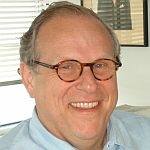 (Host)
(Host)
From his home in Hinesburg, writer and commentator Bill Schubart
recalls that his first experience in learning how to differentiate
between opinion and hard news came early when the school he was
attending was reported by a statewide newspaper to be a hive of
Communist activity.
(Schubart) In our much vaunted Information
Age where journalism, opinion, advocacy and entertainment are often
heard simply as "news," our inability to differentiate between them is
certain to feed the political chaos enveloping our country and further
endangers our democracy.
I first heard the term "media literacy"
in 1962 as a senior at Phillips Exeter in New Hampshire. I was
president of the Literary Club when Exeter came under furious editorial
attack by the publisher of the Manchester Union Leader, William Loeb.
Loeb was famous for ignoring journalistic tradition and running his
personal opinion pieces in the news section of his paper’s front page.
At the time, Loeb also owned the St. Albans Messenger and the Vermont
Sunday News .
My American history professor at Exeter was a
renowned historian named Henry Bragdon. He had just co-authored, The
History of a Free People , which was adopted widely as a text in
schools. This infuriated William Loeb, who came to see Exeter as a
hotbed of Communism.
Bragdon’s publisher inadvertently fanned
the flames by publishing the first edition with a red cover, which to
Loeb only verified its Communist origins. Another leftist indicator was
its use of the word "genocide" to describe government policy towards
Native Americans.
On the front pages of New Hampshire’s largest
newspaper, Exeter became, "That Little Red Schoolhouse in Exeter," and
by inference, I became a member of the Comintern.
My response
was to invite Loeb to Exeter for a dialogue. I was ignored. Loeb
apparently had little tolerance for dialogue, less for dissent. A decade
later, a book critical of Loeb exposed his efforts to hide his Jewish
background, expunge the record of an earlier marriage, and fabricate
experience as a Hearst journalist.
The mash-up we now call
"news" imperils our democracy. Information needs to be vetted by skilled
editors and fact-checkers to ensure that it is accurate, unbiased and
verifiable. Too often I hear otherwise intelligent adults earnestly
reciting opinion as news. Kids often say they get their news from Comedy
Central or Saturday Night Live .
News by its nature must be
selective and that is often seen as biased, but responsible reporting on
any topic must be derivative of fact, not opinion. Conservatives claim
the NY Times is liberal and liberals claim that the Wall Street Journal
is conservative, yet both still invest to some degree in ensuring that
news is more or less news. Most, bias judgments usually derive from a
paper’s editorial stance.
But now, the likes of Walter Cronkite
and A.J. Liebling have been replaced by Rush Limbaugh, Rachel Maddow and
Bill Maher, all bringing us opinion and entertainment that we hear as
news.
To be educated and to be citizens in a democracy, young
people must be media-literate. We need to integrate media literacy into
our schools so our children can differentiate between fact-based
journalism, someone’s opinion, marketing and satire. If they can’t,
their votes will be ill-informed and we will put our democracy even
further at risk.